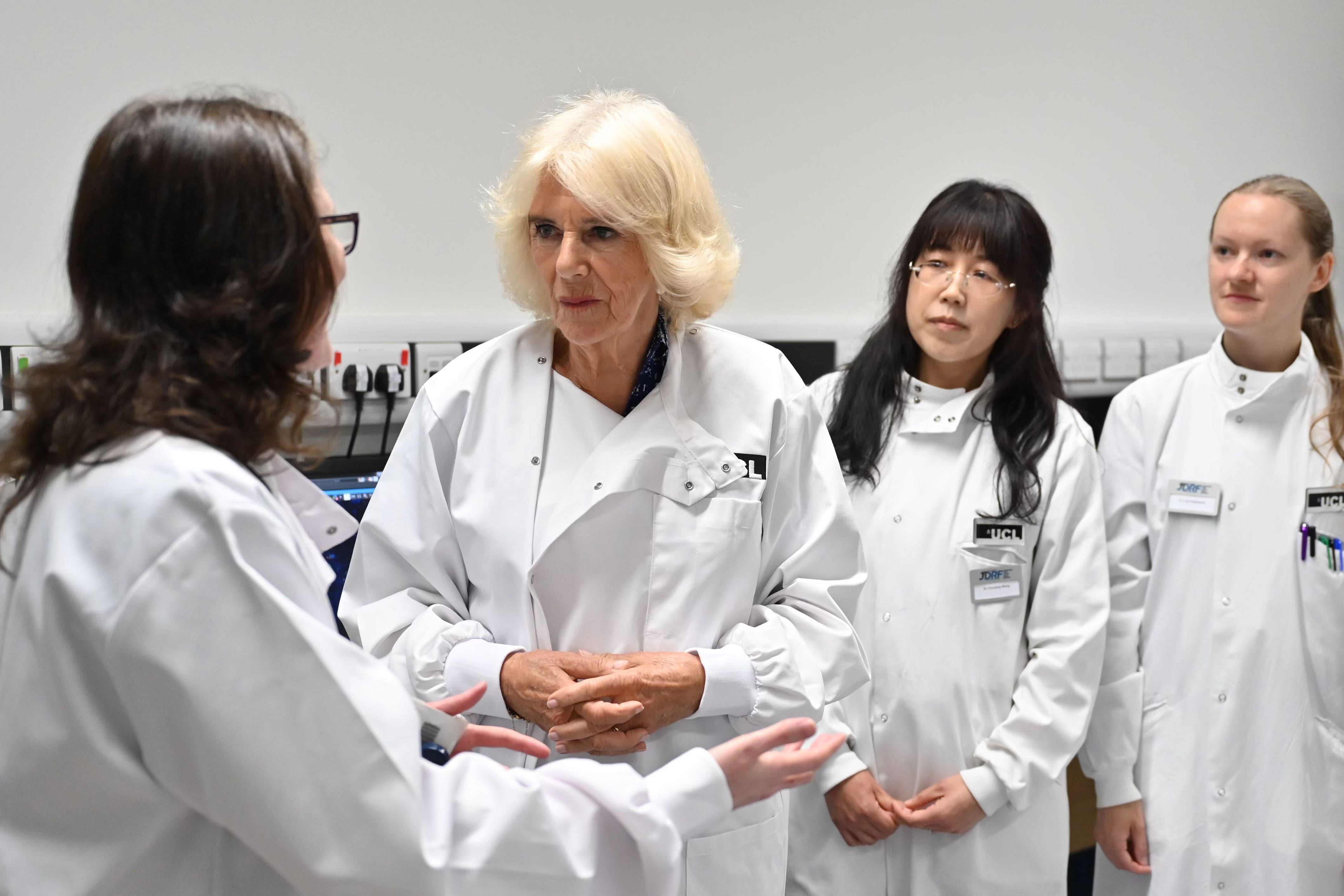Queen dons lab coat to learn about diabetes research
Camilla praised University College London scientists for their work.

The Queen donned a white lab coat to learn about pioneering new research into type 1 diabetes, and was praised for keeping active by Mr Motivator.
Camilla toured a University College London (UCL) department meeting researchers leading work that aims to prevent type 1 diabetes, by stopping the body’s immune attack response that causes the disease.
The research is funded by a partnership of charities established by the UK affiliate of leading global type 1 diabetes charity JDRF, and a number of the organisation’s supporters attended the event including Mr Motivator, former EastEnders actress Nina Wadia and the Duke and Duchess of Sussex’s wedding cellist Sheku Kanneh-Mason and former prime minister Theresa May.
Camilla, who became president of JDRF UK in 2012, praised researchers and the charity’s supporters gathered for a reception following her visit.
She made the room laugh when she looked at Mr Motivator and said: “Can I just say, nothing would happen without all of you, we’re being well motivated – you do do an incredible job.”
Speaking about JDRF UK, she added: “When I first became part of it I knew nothing about it and rather like a lot of people out there, you combine diabetes type 1 with type 2.
“I’ve learnt so much about it … and I can see the progress that’s being made and I’m sure that a cure is probably not very far away, so fingers crossed and thank you again.”
Earlier, the Queen put on a white lab coat and was given a guided tour of the research area by Lucy Walker, professor of immune regulation at UCL’s Institute of Immunity and Transplantation based at the Pears Building, Royal Free campus in Hampstead, London.
Type 1 diabetes is an autoimmune disease where the body’s immune system attacks beta cells in the pancreas which produce insulin, a hormone that helps the body use sugar for energy. People with the condition must monitor blood sugar levels and take insulin every day.
When she stopped to talk to one researcher, she was given a detailed explanation about the use of lasers to study the immune cells which attack the beta cells, and said: “It’s fascinating, I can’t say I understand it, but you’re doing a fantastic job.”
Camilla was taken to another lab where she looked at a tissue sample showing the beta cells, peering through a microscope at the slide.
When the Queen met Mr Motivator, whose daughter has type 1 diabetes, they talked about exercise and she mentioned her love of ballet with Silver Swans, classes for elderly ballet dancers run by the Royal Academy of Dance.
“She said she does ballet for her balance and I told her that was really important,” said the fitness instructor, a former staple of breakfast television leading workouts on GMTV, whose real name is Derrick Evans.
Speaking about his daughter, who is living with type 1 diabetes, Mr Motivator added: “What I’m looking for is the solution, so that anyone who has type 1 diabetes can have a long and healthy life.
“And the only way that’s going to happen is that we’re going to make it much easier for them to control the insulin.”
Mrs May, diagnosed with type 1 diabetes in 2012, has launched an inquiry into eating disorders and type 1 diabetes with Sir George Howarth MP, vice-chair of the All-Party Parliamentary Group for Diabetes.
She said the research work of the JDRF, founded in 1970 in America under the name Juvenile Diabetes Research Foundation, was an important element that attracted her to the charity, adding: “So it’s finding the new technology that helps us to manage our diabetes better, but also looking for that cure.
“And how we ensure that future generations actually don’t even get type 1 but also children today are able to live a better life.”
Subscribe to Independent Premium to bookmark this article
Want to bookmark your favourite articles and stories to read or reference later? Start your Independent Premium subscription today.
